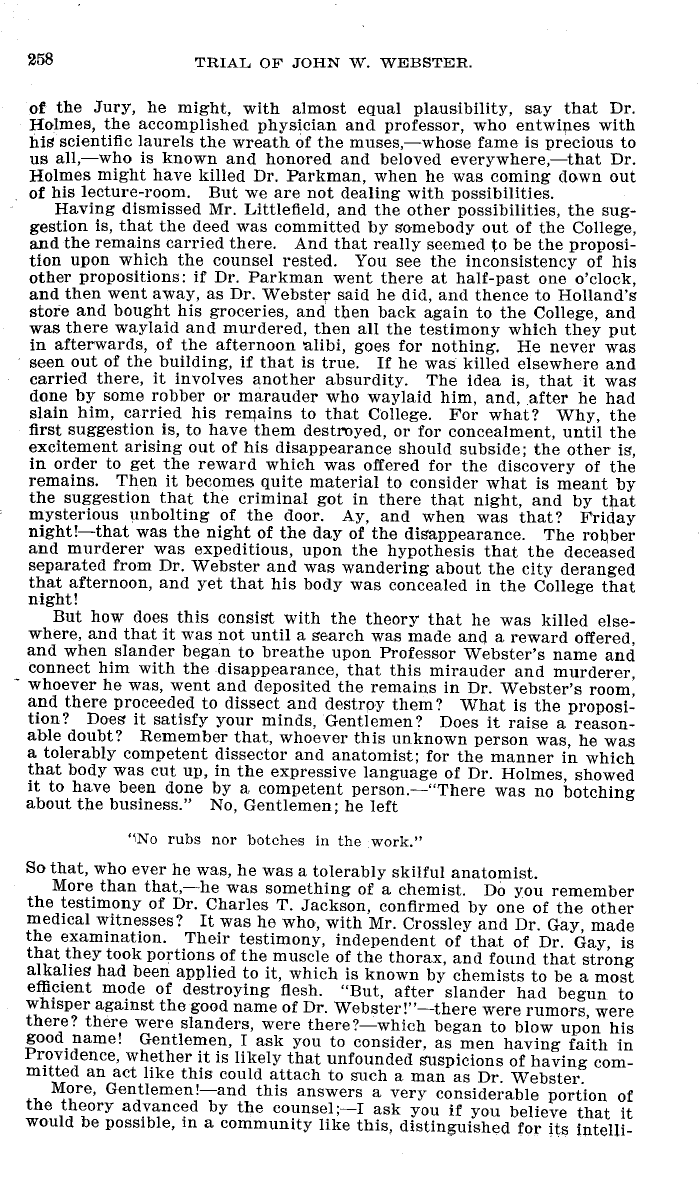|
258 TRIAL OF JOHN W. WEBSTER.
of the Jury, he might, with almost equal plausibility, say that Dr.
Holmes, the accomplished physician and professor, who entwines with
big scientific laurels the wreath of the muses,-whose fame is precious to
us all,-who is known and honored and beloved everywhere,-that Dr.
Holmes might have killed Dr. Parkman, when he was coming down out
of his lecture-room. But we are not dealing with possibilities.
Having dismissed Mr. Littlefield, and the other possibilities, the sug-
gestion is, that the deed was committed by somebody out of the College,
and the remains carried there. And that really seemed to be the proposi-
tion upon which the counsel rested. You see the inconsistency of his
other propositions: if Dr. Parkman went there at half-past one o'clock,
and then went away, as Dr. Webster said he did, and thence to Holland's
store and bought his groceries, and then back again to the College, and
was there waylaid and murdered, then all the testimony which they put
in afterwards, of the afternoon alibi, goes for nothing. He never was
seen out of the building, if that is true. If he was killed elsewhere and
carried there, it involves another absurdity. The idea is, that it was
done by some robber or marauder who waylaid him, and, after he had
slain him, carried his remains to that College. For what? Why, the
first suggestion is, to have them destroyed, or for concealment, until the
excitement arising out of his disappearance should subside; the other is,
in order to get the reward which was offered for the discovery of the
remains. Then it becomes quite material to consider what is meant by
the suggestion that the criminal got in there that night, and by that
mysterious unbolting of the door. Ay, and when was that? Friday
night!-that was the night of the day of the disappearance. The robber
and murderer was expeditious, upon the hypothesis that the deceased
separated from Dr. Webster and was wandering about the city deranged
that afternoon, and yet that his body was concealed in the College that
night!
But how does this consist with the theory that he was killed else-
where, and that it was not until a search was made anti a reward offered,
and when slander began to breathe upon Professor Webster's name and
connect him with the disappearance, that this mirauder and murderer,
whoever he was, went and deposited the remains in Dr. Webster's room,
and there proceeded to dissect and destroy them? What is the proposi-
tion? Does it satisfy your minds, Gentlemen? Does it raise a reason-
able doubt? Remember that whoever this unknown person was, he was
a tolerably competent dissector and anatomist; for the manner in which
that body was cut up, in the expressive language of Dr. Holmes, showed
it to have been done by a competent person= "There was no botching
about the business." No, Gentlemen; he left
" ~No rubs nor botches in the work."
So that, who ever he was, he was a tolerably skilful anatomist.
More than that,-he was something of a chemist. Do you remember
the testimony of Dr. Charles T. Jackson, confirmed by one of the other
medical witnesses? It was he who, with Mr. Crossley and Dr. Gay, made
the examination. Their testimony, independent of that of Dr. Gay, is
that they took portions of the muscle of the thorax, and found that strong
alkalies had been applied to it, which is known by chemists to be a most
efficient mode of destroying flesh. "But, after slander had begun to
whisper against the good name of Dr. Webster! "-there were rumors, were
there? there were slanders, were there?-which began to blow upon his
good name! Gentlemen, I ask you to consider, as men having faith in
Providence, whether it is likely that unfounded suspicions of having com-
mitted an act like this could attach to such a man as Dr. Webster.
More, Gentlemen!-and this answers a very considerable portion of
the theory advanced by the counsel ;-I ask you if you believe that it
would be possible, in a community like this, distinguished for its intelli-
|

